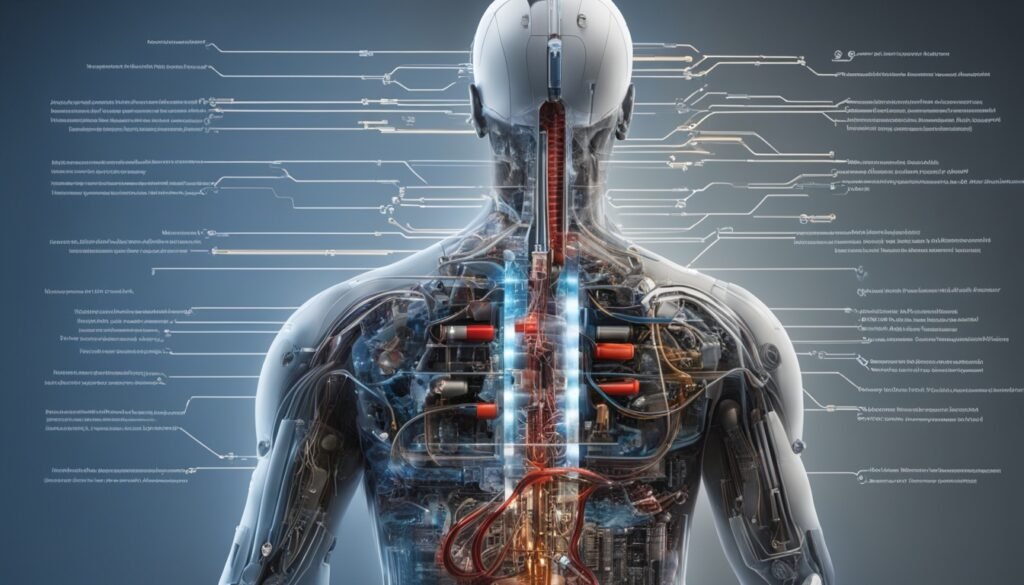Biomedical engineering is booming, changing how we look at healthcare. Biomedical engineers are the brains behind new medical devices, imaging tools, and life-enhancing implants. To shine in this field, biomedical engineers need to be skilled in biology, engineering, and problem-solving.
Key Takeaways
- Biomedical engineering combines biology and engineering expertise to create solutions for healthcare challenges.
- Biomedical engineers design a wide range of medical devices, imaging technologies, and implants to improve patient care.
- Strong problem-solving, analytical, and technical skills are essential for success as a biomedical engineer.
- Hands-on experience through internships and research opportunities can enhance a biomedical engineer’s skill set.
- Certification and professional licensing can further demonstrate a biomedical engineer’s expertise and commitment to the field.
Understanding Biomedical Engineering
Biomedical engineering blends biology with engineering to tackle healthcare issues. Biomedical engineers work in many fields, using their skills to help everyone.
Combining Expertise in Biology and Engineering
These engineers use both biology and engineering knowledge. They mix what they know about the body with mechanical, electrical, and chemical engineering.
Designing Biomedical Equipment and Devices
They create many things like prosthetic limbs and artificial organs. They also make diagnostic machines and medical software. Their goal is to make healthcare better for all.
The area of biomedical engineering is always growing. It brings together many kinds of engineering to make new solutions. As health needs more of these innovations, biomedical engineers play a key part in responding.
“Biomedical engineering is the application of engineering principles and methods to the solution of problems in biology and medicine.”
Top Skills for Biomedical Engineers

Biomedical engineers are key players in health care. They mix biology, engineering, and technology skills. Essential skills for them include biomedical engineering skills, medical device expertise, and management and communication abilities.
Biomedical Engineering Skills
Biomedical engineers have vital skills in their field. They understand various engineering techniques. These include problem-solving, analytical thinking, research, and data analysis.
They solve issues using their knowledge of electronic engineering and programming. This helps them create new medical innovations.
Medical Device Expertise
These engineers design, develop, and enhance medical devices. They need to know a lot about medical technology, materials, and how to make things. By keeping up with the latest in bioengineering, they make devices that boost patient care.
Management and Communication Abilities
Biomedical engineering experts also need to be good at working with teams and sharing information. They work with many professionals. This means they must be good at speaking, writing, and project management. They must make complex topics easy to understand.
To do great work in biomedical engineering, one needs a mix of engineering techniques, medical device expertise, and management and communication abilities. These skills, combined with education and experience, help them serve the health care sector and better lives worldwide.
| Skill | Description |
|---|---|
| Biomedical Engineering Skills | Understanding of engineering techniques, troubleshooting, analytical thinking, research, and data analysis |
| Medical Device Expertise | Knowledge of medical technology, materials science, and manufacturing processes to design and develop innovative medical devices |
| Management and Communication Abilities | Effective verbal and written communication, project management, and the ability to translate complex technical information |
“Biomedical engineers are the bridge between advancements in science and their practical application in the healthcare industry.”
Essential Problem-Solving and Research Skills
Biomedical engineers lead in creating new technologies to better human health. To be successful, they need top-notch problem-solving and research skills. These are crucial for solving engineering problems and pushing engineering sciences ahead.
Troubleshooting and Analytical Thinking
Biomedical engineers face special tasks that demand strong troubleshooting and analytical thinking. They are naturally curious and use their skills to explore new ideas. These ideas aim to meet healthcare needs. By thinking critically and systematically, they find new solutions. These solutions can change patients’ lives.
Research and Data Analysis
Research and data analysis are musts for a biomedical engineer. They collect and examine info carefully. They use the latest tech and the National Institute of Biomedical Imaging and Bioengineering’s resources. This way, they can make choices fully. They also improve biomedical devices and equipment’s quality. Plus, they guarantee their work is safe and works well.
Employers really value these problem-solving and research skills. This is why lots of students choose biomedical engineering as a major. With these skills, biomedical engineers can solve tough issues. They can use advanced technology to enhance human health and life quality.
Quality Assurance and Planning
Biomedical engineers, mainly in industry, work hard to ensure quality control and assurance. Their job is key because what they make affects people’s health and safety. They need good planning and project management skills to see complex tasks through.
Quality Control and Assurance
While biomedical engineers have various backgrounds, they all work to maintain the quality control and assurance. They use strong engineering methods and systems to check the reliability, safety, and effectiveness of their devices and technologies.
- Conducting rigorous testing and validation procedures to ensure products meet regulatory requirements and performance specifications
- Developing quality management systems to monitor and continuously improve manufacturing processes
- Collaborating with cross-functional teams to identify and mitigate potential risks or defects
- Analyzing data and feedback to make data-driven decisions that enhance quality and efficiency
By focusing on quality control and assurance, they help make biomedical breakthroughs. These solutions can better patient outcomes and even save lives.
“Quality is never an accident; it is always the result of high intention, sincere effort, intelligent direction and skillful execution; it represents the wise choice of many alternatives.” – William A. Foster
Technical Skills in Electrical Engineering and Programming
Biomedical engineers have a big role in making new medical devices. They use electrical engineering and programming skills to create these gadgets. Being good at electrical engineering and knowing Python well is key for success in this area.
Electrical Engineering Knowledge
Biomedical engineers need strong skills in electrical engineering. They work on making and testing electrical tools used for health. They focus on things like biosensors and devices for medical images and patient signals.
Your knowledge in this field helps make better tools that help patients.
Proficiency in Python Programming
Biomedical engineers also must be good at programming, especially in Python. Python is used a lot in the medical technology field. It helps them automate tasks, study data, and make software suited for their work.
Knowing Python helps these engineers make and run medical devices. It also helps handle and make sense of the data these devices collect.
| Technical Skill | Importance for Biomedical Engineers |
|---|---|
| Electrical Engineering Knowledge | Essential for designing, developing, and testing medical devices and equipment |
| Proficiency in Python Programming | Enables automation, data analysis, and custom software development for biomedical applications |
Getting good at these technical skills in electrical engineering and programming is crucial. It allows biomedical engineers to come up with new ideas that boost healthcare. These skills are very important in the biomedical engineering world. They’re vital for anyone wanting to succeed in a field that’s always changing.
Biomedical Engineer

Biomedical engineers are key in healthcare, using engineering know-how to create and update medical devices. They work on all sorts of equipment, like prosthetics and imaging machines.
Roles and Responsibilities of Biomedical Engineers
They team up with healthcare workers for safe and effective tech use. They design, test, and improve devices, making sure they meet high standards.
- Designing and developing innovative biomedical devices and equipment to meet the evolving needs of the healthcare industry
- Testing and evaluating the performance and safety of medical devices and equipment to ensure they meet regulatory standards
- Troubleshooting and maintaining existing biomedical equipment to ensure optimal functionality
- Analyzing data and conducting research to identify areas for improvement in medical technologies
- Collaborating with cross-functional teams, including clinicians and researchers, to identify and address complex healthcare challenges
- Ensuring the effective and safe integration of biomedical technologies into clinical settings
Combining engineering expertise and medical knowledge, biomedical engineers are vital in healthcare improvements. Their work pushes medical technology forward, making care better for patients.
“Biomedical engineers are the innovators who make it possible to transform cutting-edge research into life-changing medical technologies.”
The need for many engineering people in healthcare is growing. This change keeps biomedical engineers working at the front of medical progress.
Educational Requirements

To become a biomedical engineer, getting a bachelor’s degree in biomedical engineering is key. You could also study other types of engineering, like mechanical or chemical. Biomedical engineering programs teach you how to use engineering to solve health problems.
For bigger jobs, like leading a research team, you usually need a master’s degree in biomedical engineering. Graduate programs focus on advanced topics. These include making new tissues, studying how bodies move, or taking pictures inside the body. They help you become a leader in biomedical engineering.
Getting involved in internships, co-ops, and research is also important. This experience lets students use what they’ve learned in real life. It helps them gain the skills to be successful in biomedical engineering.
| Degree Level | Typical Educational Path |
|---|---|
| Bachelor’s Degree | Four-year undergraduate degree in biomedical engineering or a related engineering field |
| Master’s Degree | Two-year graduate program in biomedical engineering for advanced positions and specialized roles |
By mixing solid engineering knowledge with real-world practice, future biomedical experts can excel. This approach helps in navigating the exciting changes within the field.
Gaining Practical Experience
Aspiring biomedical engineers can get important experience through internships and research. These experiences teach them what it’s like to work as a biomedical engineer. They also help them learn skills needed to do well in the field.
Internships and Co-ops
Internships and co-ops let students work with the pros. Students use what they’ve learned in real engineering projects. These programs also help them make industry contacts and explore different career paths.
Research Opportunities
Research work is also key for biomedical engineering students. It lets them work with the latest tech and help create new devices. This boosts their tech skills and problem-solving abilities, making them more appealing to employers.
Overall, getting hands-on experience through internships, co-ops, and research can really help. It shows that students are dedicated and capable of using what they’ve learned in real jobs. This makes them strong candidates for jobs in biomedical engineering.
| Experience Type | Benefits |
|---|---|
| Internships and Co-ops |
|
| Research Opportunities |
|
“Gaining practical experience is crucial for aspiring biomedical engineers. These hands-on opportunities can give candidates a competitive edge when applying for jobs after graduation.”
Certifications and Licensing

The world of biomedical engineering isn’t just about knowing the tools. To show they’re qualified, professionals often need special certifications and licenses. These marks of achievement demonstrate high skill levels in a competitive job market.
Professional Certifications for Biomedical Engineers
Some paths in biomedical engineering need specific certifications, like the Certified Biomedical Auditor or Master Certified Electronics Technician. These show employers an individual’s focused training and talents.
For biomedical engineers, passing the Fundamentals of Engineering (FE) and Practice of Engineering (PE) exams is key. These crucial steps lead to proper certifications, proving their ability to apply engineering in biomedical tech.
| Certification | Description |
|---|---|
| Certified Biomedical Auditor | Validates expertise in conducting audits and assessments of biomedical equipment, processes, and quality systems. |
| Master Certified Electronics Technician | Demonstrates advanced knowledge and skills in the design, development, and maintenance of biomedical electronic devices and systems. |
| Fundamentals of Engineering (FE) Exam | Assesses an individual’s understanding of the engineering principles and their ability to apply them in the field of biomedical engineering. |
| Practice of Engineering (PE) Exam | Evaluates an engineer’s competence in the practical application of engineering methods and principles in the biomedical industry. |
These certifications do more than just show what someone knows. They prove a dedication to ongoing learning. With these, biomedical engineers can boost their career chances, showing they can effectively use their skills in creating and integrating biomedical technologies.
Also Read: Pushing Boundaries: Cutting-Edge Data Science Engineering Innovations
Conclusion
Becoming a biomedical engineer means knowing a lot about biology and engineering. You need to be good at solving problems and have technical skills. To get into this field, you need the right education, do internships, and get certified.
Biomedical engineering lets you use the latest technology to help improve health. You could work on medical devices, find new treatments, or do important research. By doing this, you help make healthcare better and improve the lives of many.
As science and tech keep growing, so does the need for biomedical engineers. This creates many chances for those who are skilled and want to help others. It’s a field where you can truly make a difference in the world.
FAQs
Q: What skills do you need to become a biomedical engineer?
A: To become a biomedical engineer, you need a strong background in mathematics, science, and engineering disciplines. Skills in biomaterials, tissue engineering, neural engineering, and mechanical engineering are also beneficial.
Q: What are the job prospects for biomedical engineers?
A: According to the Bureau of Labor Statistics, job growth for biomedical engineers is expected to be faster than average. Biomedical engineers work in various fields such as medical equipment development, research and development, and rehabilitation engineering.
Q: What is the difference between bioengineers and biomedical engineers?
A: Bioengineers and biomedical engineers both work towards improving human health through engineering solutions. While bioengineers focus on biological systems, biomedical engineers may work on a broader range of medical equipment and systems.
Q: What degree do you need to pursue a career in biomedical engineering?
A: To enter the field of biomedical engineering, you typically need a degree in biomedical engineering or a closely related discipline. Many biomedical engineers hold a graduate degree in the field.
Q: What kind of work experience do biomedical engineers typically need?
A: Biomedical engineers must often have prior work experience in engineering, research and development, or related fields. This experience is valuable for understanding the practical applications of their work.
Q: What is the future outlook for careers in biomedical engineering?
A: The future of biomedical engineering looks promising, with continued advancements in medical technology and increased demand for innovative solutions. Graduate programs in biomedical engineering are also expanding to meet this demand.
Q: How much do biomedical engineers typically earn?
A: Biomedical engineers earn competitive salaries, with the median pay being higher than the average for all occupations. The exact salary can vary based on factors such as education, experience, and area of specialization.
Source Links
- https://graduate.northeastern.edu/resources/biomedical-engineer-skills/
- https://apps.illinoisworknet.com/cis/clusters/OccupationDetails/100512?parentId=110800§ion=skills§ionTitle=Skills and Abilities
- https://online-engineering.case.edu/blog/how-to-prepare-for-a-career-in-biomedical-engineering

